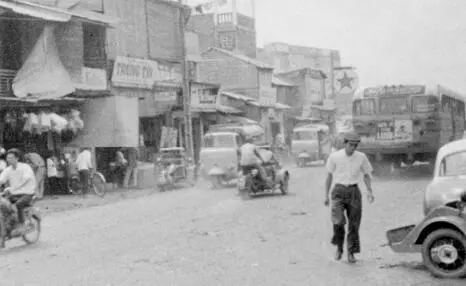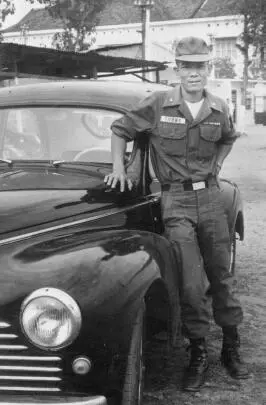‘Partly, yes,’ I said, trying to hide my surprise at her insight. ‘And it’s partly to do with me. And my life.’
She turned my ring round on my finger, then sighed and let my hand go. She busied herself meticulously rolling a thin cigarette. I lit up to keep her company and the two of us puffed away in silence for a few moments.
‘It’s so far away,’ she said, finally. ‘I think that’s what’s bothering me. You’re going to be on the other side of the world.’
‘I won’t be there forever.’
‘For how long, then?’ she asked, almost aggressively.
‘I’m not sure, yet. I have to get out there first.’
‘I may never see you again,’ she said, her eyes suddenly large with tears.
‘Don’t be so silly, darling,’ I said, perhaps more testily than I meant. ‘You know, I have a life to lead as well as you two. I can’t just sit and rot on Barrandale.’
‘Of course,’ she said, letting her body sag in the chair, closing her eyes and smiling to herself. ‘I just like the idea of you being close at hand.’
We hugged goodbye on the pavement and I promised I would call her as often as possible. She seemed more reconciled to the idea of my going away, now we were outside the restaurant, and I wondered if the pointed Vietnam theme had been a bad idea. Too late, anyway. I watched her saunter away towards her bus stop, a tall, thin and limber young woman in her shaggy coat, her long hair halfway down her back, and felt the old love-pang corkscrew through me. My pretty, stubborn, clever, complicated daughter.
When I returned to the hotel there was a message to call Lockwood at the Sketch.
‘Hello, Lockwood, it’s me.’
‘You’re on. Bon voyage. ’
Lockwood was not entirely accurate: I wasn’t wholly ‘on’ at all. Sentinel Press Services had grudgingly agreed to take me on as a stringer but only for a trial month for which I would be paid $200. I would also have to pay for my own transportation out to Vietnam and my accommodation once I arrived in Saigon. And no expenses. I could only agree. Sentinel did have a small permanent bureau in Saigon, Lockwood said, with a staff of three, including a photographer. ‘They did take a bit of persuading, Amory,’ he said, knowingly, and I wondered if Lockwood or the Daily Sketch were underwriting my meagre paycheck. One photographer is never enough, I said, surely. I think Lockwood was trying to make me understand the brutal realities of the situation but I was already excited. I didn’t care — I was going to my war. I negotiated one further condition in the light of these restrictions — and the fact that I was hardly being paid at all. I don’t know why I insisted but it was one of the smartest moves I ever made in my life, as it turned out. I told him I would license my photos to Sentinel for first-use but I would retain the copyright. That shouldn’t be a problem, he said. Just make sure we get all your best stuff, here. I think by then Lockwood was assuming I’d go out there, have my short adventure, then suffer and be miserable, flush the idea out of my system and come home, having proved myself. I think he calculated I’d last a couple of weeks and $200 was a small price to pay for getting me off his back. How wrong he was.
When I arrived in Saigon I started keeping an intermittent journal, filling it with my impressions and thoughts and sticking in some of the photographs I took. I think I already had the idea that I might make a book out of this experience.

Saigon, Vietnam, 1967. From Vietnam, Mon Amour.
I was sitting in the Saigon press centre yesterday listening to the new IO give us the latest KIA and MIA 1facts, thinking that he looked a bit like Xan, and simultaneously remarking on the dozens and dozens of empty seats — someone had told me there were 700 journalists in Vietnam; where the hell was everybody? Then Mary Poundstone slipped into the plastic chair beside me. Her face was taut, her lips thinned.
‘They won’t renew my visa,’ she said. ‘Bastards. Let’s go and get a drink.’
So we went to the rooftop bar at the Caravelle Hotel 2and ordered two gins and tonic with lots of ice and found a table some distance from everyone else. Mary and I had met up again shortly after I had arrived in February (1967) having last seen each other in the Vosges mountains in 1944. I knew what she’d been up to in the interim. She had become even more of a legend since then — books of reportage, two collections of short stories, a cluster of prizes, lionisation by a new generation of writers — but in Saigon the two of us began to spend a lot of time together, seek each other out at the press briefings, so much so that we became known to the press corps as the ‘Old Gals’. I was fifty-nine, Mary was sixty-four — by some way the oldest journalists in Vietnam.
Right from the outset she started giving me advice over what to wear: khaki, white or beige masculine clothing — pants and shirts — with one feminine touch. Wear combat fatigues when you go out with the troops but don’t look like a soldier or a fashionable woman when you’re in town or at the bases. Add a bright scarf, a brooch, bangles, she advised. I decided to go the earring route and chose a pair of small gold hoops, about an inch in diameter, that I wore all the time — my trademark — even with a tin helmet. My ‘look’ was khaki chinos and a white T-shirt under an untucked, multi-pocketed cotton drill shirt, mostly tan, sometimes denim, sometimes linen, with epaulettes. Truong, 1my driver, found me a tailor on Cong Thanh Street who would run me up half a dozen of these pseudo-military shirts for a pack of 200 Salem cigarettes.

Truong, my driver. Without whom. .
The SPS bureau is in a house on a narrow side street called An Qui Alley, about a block away from Time’ s offices. The bureau chief is a grumpy, officious man called Lane Burrell. The two assigned journalists, the ‘staffers’, are Ron Paxton and a young woman with the unlikely name of Renata Alabama, the photographer. Lane Burrell told me that I was only ‘attached’ to SPS and that if ever asked I should say I was working for the London Daily Sketch. He’d do what he could to expedite my accreditation, however. He said, ‘What did you ever do to Lockwood Mower? Boy does he love you.’ I’m almost certain Lockwood is paying my way out here. Lane seems happy enough with the arrangement but I don’t think Ron and Renata are particularly pleased at my arrival and I suspect I won’t ever win them over. 2
Burrell, Paxton and Alabama live in a roomy three-bedroom apartment above the bureau offices. As part of SPS’s conditions I have to find my own place to live. I checked out an apartment above a French restaurant on Nguyen Van Thu Street, on the bad side of the Saigon River. The restaurant is called Le Mistral de Provence and that’s what made me rent the two-room apartment — memories of Charbonneau. No hot water, no air conditioning, a bed, two plastic chairs and a table and a bathroom with a shower that dripped rather than ran. It cost $50 a month.
When I arrived at Tan Son Nhut airport and stepped off the Pan Am flight from Hong Kong it was the heat that almost drove me back on the plane. I’d never experienced heat like that, furnace hot and wet at the same time. Like being dry in a warm sea. Like being wet in a dry desert. I could never quite describe it properly. Also I’d never seen so many aircraft in one place, hundreds, it appeared, civilian and military, single-seaters, four-engine Boeing jetliners — Pan Am, Cathay Pacific, PAL, Flying Tigers — Phantoms, DC-3s, and on and on — landing, taking off, parked seemingly haphazardly in ragged rows, as if casually abandoned by their pilots who’d walked away looking for a bar.
Читать дальше














